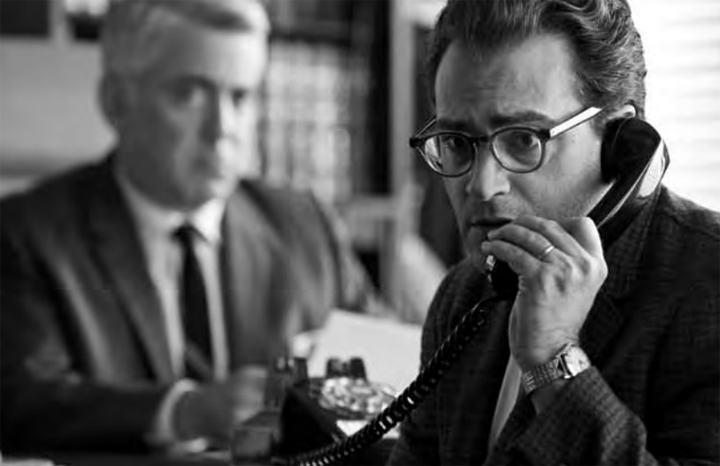
The Coens' modern Job, Larry Gopnik, is a midwestern physics professor who is informed by his wife that she is leaving him for one of his friends. His unemployed brother lives on his couch (and gets into legal trouble), his bar mitzvah–aged son smokes pot and steals money from his older sister who has been stealing it from her father to pay for a nose job. Meanwhile Larry is up for tenure. Everything looks good except that a student is both trying to bribe him to change a failing grade and threatening to sue him for accusing him of bribery, and the tenure committee has received anonymous letters discouraging his promotion. Fortunately, as the doctor tells Larry when first we meet him, he is in good health.
Larry is befuddled by his situation and a friend encourages him to see his rabbi. Committed to classical theodicy, he's tried to be a good person, so why is Hashem causing him to suffer? Larry's synagogue has three rabbis (apparently representing the primary American denominations). The junior member of the clergy offers Larry platitudes about changing perspective. Dissatisfied, Larry meets his regular rabbi who tells him a story about another congregant who came to him for counsel. He offers no good reason for telling the story and no explanation for Larry's predicament. The third rabbi, played as an old sage, is too busy thinking to meet with Larry.
Things begin to turn around when Larry's wife's suitor dies in a car crash (although Larry gets caught for the cost of the funeral). His son, though stoned, successfully completes his bar mitzvah Torah reading. At the ceremony Larry and his wife begin to reconcile. Soon afterwards a senior colleague informs him that his tenure is near certain. And then, just as quickly, things fall apart. Larry receives an expensive bill for legal fees accrued helping his brother. To pay the bill Larry changes the graduate student's grade and keeps the bribe money. Almost immediately his doctor calls urging him to come to the office. The X-rays taken at his last appointment, when he was assured of his good health, need to be discussed.
Both Larry and Job seek to understand why God apparently punishes them, but the book's readers and the movie's audience do not ask the same questions. The reader knows why Job suffers. The prologue is explicit about God's role and the reader must ask about His unjust behavior, not Job's merit. By contrast, if God is punishing Larry or even has a role to play, the Coen brothers are not telling. They have created an ambiguous situation for the audience to try to decipher. The audience does not know precisely why Larry suffers and neither does he.
For all the uncertainty in the film, the Coens are certain about one thing: The reason the apparently righteous suffer cannot be definitively explained. Larry teaches his physics class "The Uncertainty Principle." "It proves," in Larry's words, "we can't ever really know what's going on." Despite this fact, though, our actions must still be moral. The third rabbi may have refused to meet with Larry, but he offers his son Danny an important insight which may provide a key to explaining the film.
While meeting with Danny following his bar mitzvah ceremony the rabbi speaks only a few words. Completely unexpectedly he (mis)quotes Jefferson Airplane's "Somebody to Love": "When the truth is found to be lies . . . And all the hope within you dies . . . " He follows this with the big question: "Then what?" No answer is immediately forthcoming from either party. The rabbi then returns the transistor radio confiscated from Danny at Hebrew school and sends him on his way with "Be a good boy." And here we find the answer to the question.
Larry, like Job, believed in the tradition that taught that the righteous would be rewarded and the wicked punished. Both discovered that this tradition, if not wrong, could not account for their respective circumstances. Conservative rabbi and Biblicist Robert Gordis describes Job's situation as follows:
Job is aware of the contention that morality depends upon faith in divine justice. Denying the latter, how can he maintain the former? Job is driven to a desperate expedient, which is to prove one of the great liberating ideas of religion; he cuts the nexus between virtue and reward. Honest men will tremble at his undeserved suffering, but will not on that account be deterred from righteousness.
Jewish post-Holocaust interpreters of Job across the denominations, including, among others, Joseph B. Soloveitchik, Irving Greenberg, Solomon Freehof, and Elie Wiesel, offered a similar response for those who suffer like Job. Whether the calamities are deserved as a divine punishment, are the acts of a capricious deity, or are simply the result of the unfolding universe, the only appropriate response is to "be good." Larry got it wrong. As a result of the mounting misfortunes, Larry breaks when the bill from his brother's attorney arrives. Whether the doctor's subsequent call about his X-ray should be understood as a punishment for his choice is inconsequential. Being a "good boy" is about doing what is right without concern for reward or punishment. Larry's belief system may have become confused but he knew his choices concerning the bribe were wrong even before he made them. But the movie does not leave the viewer entirely hopeless. Danny, not Larry, received the rabbinic insight and has the rest of his life to become a good boy and a serious man.
The Coens are not the first to give Job comic turn. Woody Allen's name has appeared in numerous reviews of A Serious Man for his concern with theodicy and suffering. Job takes center stage in his 1974 essay in The New Republic "The Scrolls" and references to him slip into a number of Allen's films. In contrast to the Coen brothers, Allen's response to suffering is closer to the Jefferson Airplane lyric. For Allen, finding someone to love is the answer to the rabbi's "Then what?" In the movie Manhattan Allen and his (very) young lover played by Mariel Hemmingway are riding in a horse drawn carriage through Central Park. She says to him: "You know you're crazy about me." He replies, "I am. You're . . . You're God's answer to Job. You would have ended all argument between them. He'd have said 'I do a lot of terrible things but I can also make one of these.' And Job would've said 'OK, you win.'" Allen's response to suffering brings no moral imperative (and, at least according to his character Boris in Love and Death, only leads to more suffering). As he noted concerning his affair with his partner's adopted daughter, "The heart wants what it wants." Amidst his suffering Larry tried to find "love" with his seductive, married neighbor, but all it brought him were horrific nightmares. Despite his errors, he still wants to be good. The imperative still stands: "Be a good boy"; it's all a serious man can do.


 Jason Kalman (Ph.D, McGill 2005) is Associate Professor of Classical Hebrew Literature and Interpretation at the Cincinnati School of HUC-JIR and is a research fellow affiliated with the University of the Free State, South Africa. He is the author of Hebrew Union College and the Dead Sea Scrolls (HUC-JIR, 2012) and Jít Hospodinu po krku: Woody Allen, kniha Job a židovská teologie po holokaustu [Grabbing the Lord Around the Neck: Woody Allen, the Book of Job, and Jewish Post-Holocaust Theology] (Centrum pro studium demokracie a kultury, 2014) and co-author with Jaqueline S. DuToit of Canada's Big Biblical Bargain (MQUP 2010).
Jason Kalman (Ph.D, McGill 2005) is Associate Professor of Classical Hebrew Literature and Interpretation at the Cincinnati School of HUC-JIR and is a research fellow affiliated with the University of the Free State, South Africa. He is the author of Hebrew Union College and the Dead Sea Scrolls (HUC-JIR, 2012) and Jít Hospodinu po krku: Woody Allen, kniha Job a židovská teologie po holokaustu [Grabbing the Lord Around the Neck: Woody Allen, the Book of Job, and Jewish Post-Holocaust Theology] (Centrum pro studium demokracie a kultury, 2014) and co-author with Jaqueline S. DuToit of Canada's Big Biblical Bargain (MQUP 2010).